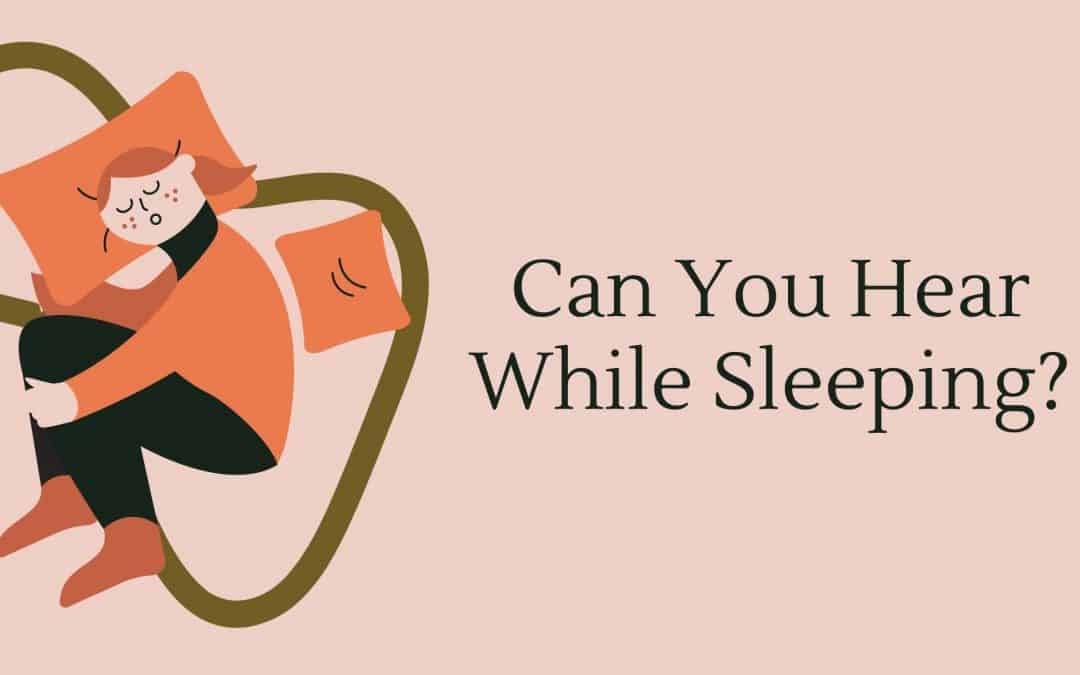Can You Hear While Sleeping?
While it is commonly thought that our brains are inactive while we sleep, the brain is actually more responsive than you know. The brain must continue processing sounds in the environment even when we are asleep. There are different sleep stages during a sleep cycle and the brain is actually more alert than you think during these stages. Although we lose conscious awareness of our surroundings while asleep, our brains still process sounds. This even includes hearing and processing external sound!
Four Sleep Stages
Sleep is not a uniform duration of rest; rather, it consists of sleep cycles. A sleep cycle is made up of four sleep stages that we experience every night during sleep. People go through several sleep cycles in one night (typically 4-6) which consist of the following stages:
Stage 1: is the first 1 to 5 minutes of falling asleep. This is the dozing off stage where the body starts to relax and the brain starts to slow down. One is not completely asleep so it is easy to awaken. But if there are no disruptions, it is easy to move on to stage 2. During this light sleep stage, the brain is still responsive to external stimuli, allowing individuals to hear sounds while sleeping.
Stage 2: during the first sleep cycle of the night, stage 2 can last for 10-25 minutes and becomes longer over the following sleep cycles. According to the Sleep Foundation, a person usually spends half of their sleep in this stage. The body and brain enter a deeper state of relaxation: there is also a reduction in temperature, heart rate and breathing are slowed, eye movements stop. Additionally, there are shorter periods of brain activity but it is difficult to wake up during this stage.
Stage 3: this phase is the deep sleep stage where the body becomes deeply relaxed: muscles, heart rate, and breathing decrease. Though brain activity is reduced, this deep sleep facilitates restoration which supports brain health. During early sleep cycles, this stage can last 20-40 minutes and get progressively shorter as the night continues. In deeper stages of sleep, the brain’s awareness of external sounds diminishes significantly.
Stage 4: the last stage of the sleep cycle is REM sleep. Brain activity increases, nearing the same levels as when one is fully awake. Simultaneously, the body remains in a deep state of relaxations except for the eyes and breathing muscles. This stage is also characterized by rapid eye movements (REM). This stage gets longer over the course of the night and is typically the stage where people experience dreams.
All of these stages do not last the same length of time but on average, are nearly 90 minutes. Sleep stages are critical because they allow the body to recuperate in ways that are essential for cognitive functions, emotional and physical health, and energy needed to sustain the body. These sleep stages are also important to understand as we look at hearing while sleeping.
Hearing While Sleeping
A recent 2019 study, published in the Human Nature Behavior Journal, examined what happened when people were exposed to external sounds while sleeping. Researchers replicated what’s called the “cocktail party problem” which essentially refers to hearing many voices at once but selectively choosing which voice you are focusing on. This ability is what allows people to be in noisier settings and hold a conversation with one person while not listening to everything else happening in the environment. Our ears and brain must continue processing sounds even while we are asleep.
They did this by playing two voices (one in each ear) while participants slept. One voice was clearly articulating full sentences and phrases while the other was speaking a kind of gibberish that was incoherent. While participants were exposed to these sounds, researchers monitored brain activity through EEG recordings. Researchers found that the brain was paying attention to the sounds that were clearly communicated “as if the brain was turning its internal volume up for this particular speaker,” Thomas Andrillon, lead author of the study said. Participants paid more attention to these cohesive sentences over the gibberish sounds played in the other ear. This highlights how the brain processes and filters auditory stimuli even during sleep.
Hearing loss can significantly impact sleep quality, making it essential to address any hearing issues promptly.
So what exactly does this mean? This study reveals that the brain responds to external sounds, meaning that you can hear while you sleep. This also aligns with the stages of sleep where the brain is more active during certain phases over others. Hearing while you sleep though does not necessarily mean that you will remember the sounds or sentences that you have heard. Similar to dreaming, you do not always remember your dreams the next day. Not remembering, however, does not mean that they did not happen. A loud sound, for instance, can disrupt sleep and trigger awakening, indicating that the brain remains partially aware of its environment.
The brain must continue processing sounds even while we are asleep, highlighting the body’s ongoing auditory awareness despite the lack of conscious thought during slumber. During the initial stages of sleep, the brain’s responsiveness to the outside world is higher, but this awareness diminishes significantly in deeper stages.
Research has shown that sleeping participants still respond to and process verbal information during light sleep, indicating that auditory processing doesn’t cease until a deeper state of sleep is reached.
At Enticare, we offer both hearing and sleep services! If you experience difficulties with either, we’re here to help. Contact us today to learn more. Prioritizing hearing health is crucial for overall well-being and quality of sleep.

